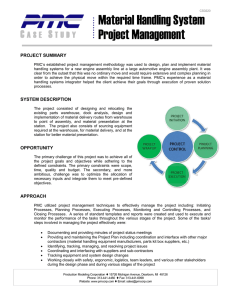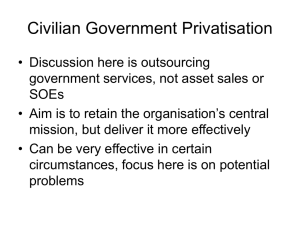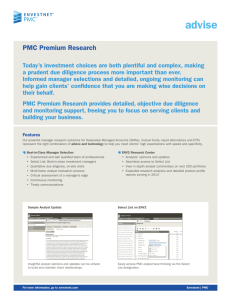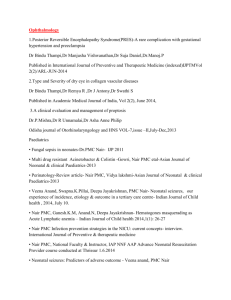The Commodification of War: Political, Legal and Moral Issues
advertisement
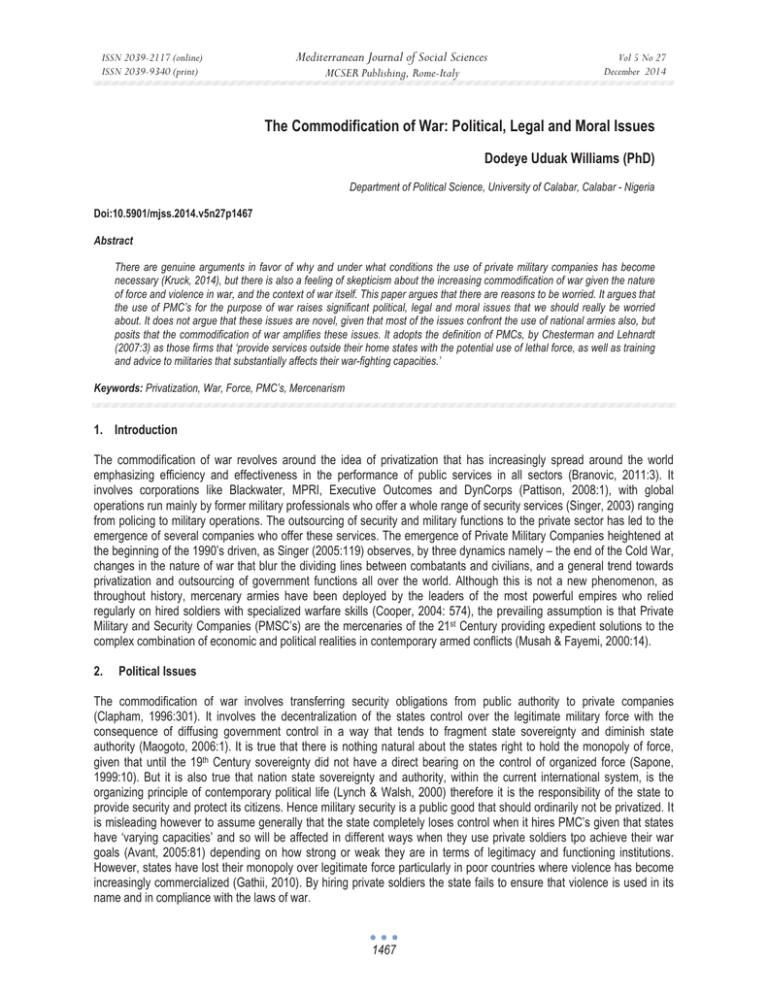
ISSN 2039-2117 (online) ISSN 2039-9340 (print) Mediterranean Journal of Social Sciences MCSER Publishing, Rome-Italy Vol 5 No 27 December 2014 The Commodification of War: Political, Legal and Moral Issues Dodeye Uduak Williams (PhD) Department of Political Science, University of Calabar, Calabar - Nigeria Doi:10.5901/mjss.2014.v5n27p1467 Abstract There are genuine arguments in favor of why and under what conditions the use of private military companies has become necessary (Kruck, 2014), but there is also a feeling of skepticism about the increasing commodification of war given the nature of force and violence in war, and the context of war itself. This paper argues that there are reasons to be worried. It argues that the use of PMC’s for the purpose of war raises significant political, legal and moral issues that we should really be worried about. It does not argue that these issues are novel, given that most of the issues confront the use of national armies also, but posits that the commodification of war amplifies these issues. It adopts the definition of PMCs, by Chesterman and Lehnardt (2007:3) as those firms that ‘provide services outside their home states with the potential use of lethal force, as well as training and advice to militaries that substantially affects their war-fighting capacities.’ Keywords: Privatization, War, Force, PMC’s, Mercenarism 1. Introduction The commodification of war revolves around the idea of privatization that has increasingly spread around the world emphasizing efficiency and effectiveness in the performance of public services in all sectors (Branovic, 2011:3). It involves corporations like Blackwater, MPRI, Executive Outcomes and DynCorps (Pattison, 2008:1), with global operations run mainly by former military professionals who offer a whole range of security services (Singer, 2003) ranging from policing to military operations. The outsourcing of security and military functions to the private sector has led to the emergence of several companies who offer these services. The emergence of Private Military Companies heightened at the beginning of the 1990’s driven, as Singer (2005:119) observes, by three dynamics namely – the end of the Cold War, changes in the nature of war that blur the dividing lines between combatants and civilians, and a general trend towards privatization and outsourcing of government functions all over the world. Although this is not a new phenomenon, as throughout history, mercenary armies have been deployed by the leaders of the most powerful empires who relied regularly on hired soldiers with specialized warfare skills (Cooper, 2004: 574), the prevailing assumption is that Private Military and Security Companies (PMSC’s) are the mercenaries of the 21st Century providing expedient solutions to the complex combination of economic and political realities in contemporary armed conflicts (Musah & Fayemi, 2000:14). 2. Political Issues The commodification of war involves transferring security obligations from public authority to private companies (Clapham, 1996:301). It involves the decentralization of the states control over the legitimate military force with the consequence of diffusing government control in a way that tends to fragment state sovereignty and diminish state authority (Maogoto, 2006:1). It is true that there is nothing natural about the states right to hold the monopoly of force, given that until the 19th Century sovereignty did not have a direct bearing on the control of organized force (Sapone, 1999:10). But it is also true that nation state sovereignty and authority, within the current international system, is the organizing principle of contemporary political life (Lynch & Walsh, 2000) therefore it is the responsibility of the state to provide security and protect its citizens. Hence military security is a public good that should ordinarily not be privatized. It is misleading however to assume generally that the state completely loses control when it hires PMC’s given that states have ‘varying capacities’ and so will be affected in different ways when they use private soldiers tpo achieve their war goals (Avant, 2005:81) depending on how strong or weak they are in terms of legitimacy and functioning institutions. However, states have lost their monopoly over legitimate force particularly in poor countries where violence has become increasingly commercialized (Gathii, 2010). By hiring private soldiers the state fails to ensure that violence is used in its name and in compliance with the laws of war. 1467 ISSN 2039-2117 (online) ISSN 2039-9340 (print) Mediterranean Journal of Social Sciences MCSER Publishing, Rome-Italy Vol 5 No 27 December 2014 Historically, states had political influence over the circulation of weapons in the world market through export controls but with increasing commodification some states no longer exert explicit control over military technology or manpower (Sapone, 1999:19). It is now private companies that own and manage the global military industrial complex (Turley, 2014). One can argue that without mercenary activities, states already have several problems dealing with the proliferation of arms but the implication of outright commodification is that economic forces, rather than calculated political decisions increasingly determine global allocation of weapons (Sapone, 1999:19). This situation poses a threat to international peace and security since it makes it easier for whoever can afford these weapons and services to hire them, including criminally minded militia groups, rebel groups and terrorist organizations. Furthermore, when a state entrusts a PMC with the responsibility of fighting its wars or assisting in prosecuting wars, it is vulnerable to be unduly influenced by the corporation over the conduct of its foreign policy. As Avant (2005) points out, PMC’s like Blackwater are alleged to have influenced US foreign policy in significant ways. Also Executive Outcomes (EO), a South African Company, though applauded for its considerable impact on African politics is also said to have usurped economic and political power in some of these states (Sapone, 1999:17). In March 2004, Logo Logistics, a British-South African PMC, was accused of a plot to remove the Malabo government in Equatorial Guinea (Singer, 2005:4). This is not to suggest that states should not seek advise from experts before making decisions as Fabre (2010:556) points out, but the challenge is to maintain a balance and sift genuine advice from profit-seeking corporations whose main agenda is to make financial gain and who lack the proper authority to be involved in the business of war. Thirdly, commodification of military force tends to undermine democratic accountability by circumventing parliamentary constraints on the use of force and reduces control on the battlefield (Pattison, 2010). When PSC’s deliver military services, they alter the process through which force is controlled. They reduce transparency and alter the democratic process. This is not to suggest that all states have perfect democratic processes that are always adhered to but as Avant (2006:14) observes clearly, the very flexibility that makes PMCs so allegedly effective also redistributes power in the US by empowering the executive over Congress, reducing transparency and making it easier for commercially interested actors to impact policy. This undermines the capacity to hold politicians accountable. War is the business of the state and when it hires PMCs to perform vital national security functions in a war zone, it is an attempt to avoid democratic responsibility and this should not be encouraged at a time when most humanitarian interventions are partly aimed at establishing democratic institutions. Finally, increasing commodification of war implies that there are groups of people who offer more efficient military and security services than the state. While this is empirically true, it is not a situation that should be encouraged especially in failing states where too many non-state actors are involved in the conduct of war. As Johnson (1999:191) observes, only allowing states to wage or authorize war will restrict the number of agents that may legitimately undertake it thereby making the international system more peaceful and orderly. The claim that PMC’s are more effective in delivering security and fighting wars is a problem because no group should be more effective than the state in handling military security issues within and, especially, outside its borders. Again, it will decrease opportunities for democratic control over the use of force and weaken institutional mechanisms for holding those who authorize war accountable. 3. Legal Issues From a strictly legal perspective, PMC’s operate in a grey area (Kinsey, 2006:134). Their status is not clearly addressed, they do not have any rights or obligations under current international humanitarian law and where any reference to them is made it is ambiguous and poorly defined (Coady, 1992). For instance PMC employees are denied the status of combatants and Prisoners of War (POW) (Protocol 1, Article 47). Under International Human Rights Law (IHL) one is either a combatant or a civilian. Combatants are the only ones permitted to participate legally in a conflict and therefore can be legally attacked but civilians are immune from attack and are prosecuted if they participate in hostilities (Heinze, 2009:136). PMC employees are, legally, neither here nor there and the advantage for states to use them is mainly because they fall outside these accountability mechanisms that are present for members of the armed forces, as Johnson (1999) points out. This is problematic and especially where the states that should be interested in strengthening international law by solving this problem are taking advantage of it. Secondly, according to the Geneva Convention, Article 147, a state is responsible for violations of humanitarian international law that are attributed to it (Henckaert and Doswald, (2005:530). The articles on State Responsibility establish a number of general principles that can be attributed to the state in the light of international law and many who support the use of PMC’s argue that these laws apply to PMC’s as well (Abrisketa, 2007:10). The assumption is that PMC’s, are ‘quasi state actors’ (Singer, 2003:532) who act in the name of the state therefore all crimes committed by their employees should naturally be the responsibility of the state. While this appears simple, in practice it is difficult to trace 1468 ISSN 2039-2117 (online) ISSN 2039-9340 (print) Mediterranean Journal of Social Sciences MCSER Publishing, Rome-Italy Vol 5 No 27 December 2014 the activities of PMC’s to the state especially when they commit war crimes and contravene international humanitarian laws. As Zarate (1998:75) rightly argues, states use PMCs to pursue foreign policy objectives through covert violence that allows them to use these contractors as political pawns to influence the internal affairs of other countries while effectively retaining their official neutrality. Some could argue like Singer (2003:532) that where war crimes are committed suing the specific company is an option. But we have to remember, that the article of state responsibility as Dumberry (2006) states, requires that it should involve the conduct of a state organ. PMC’s are not state organs but contractors and traditionally, they are not ‘duty bearers under international law’ (Ryngaert, 2008:1038). One cannot rightly assume the extent to which the state really has control over the conduct of the employees of a PMC and whether their conduct can be considered state conduct in the context of international law. Thirdly, PMC’s enjoy immunity that can lead to impunity and which could further lead some states to recruit these contractors in order to deliberately avoid direct legal responsibility (Boggs, 2008:1). It is often alleged that the employees of PMC’s commit serious war crimes in conflict zones. An example is when DynCorp employees working for the US or the UN were implicated in prostitution rings in Bosnia, they were dismissed and never prosecuted (Kelly, 2002). While there is little or no empirical evidence to suggest that private soldiers commit more war crimes than ordinary soldiers, there is ample empirical evidence to show the difficulties and complications involved in prosecuting crimes committed by private soldiers. There is lack of effective regulation and the wrongful activities of mercenaries tend to go unpunished (Ryngaert, 2008). Accountability in war demands that someone should be held responsible for actions and decision. However, while a contractual relationship between a PMC and a state may be sufficient for purposes of state responsibility, it is not sufficient to render an individual contractor part of a states armed forces which is a necessary requirement for a PMC becoming a lawful combatant in order to be held accountable for their conduct (Cameron, 2006:584). It is true that states can hold PMCs accountable but if states are to hold PMCs legally accountable for their behavior in war then this defeats the whole advantage of outsourcing in terms of overcoming the reluctance of states to get involved in ‘humanitarian interventions’ (Cameron, 2006:584). Finally, these arguments are not intended to suggest that ordinary soldiers are better than private soldiers and do not pose any legal problems because, as Cook (2010) rightly points out, it is fallacious to assume that a national army has higher moral standing in issues relating to war. It is not the case that states armed forces comply with regulations all the time. But the problem remains that while an ordinary soldier can be court-martialled if he commits war crimes, the state is unable to effectively control the behavior of the PMC employees since they are not accountable to it but to their own employers. Individuals who play a prominent role in war must be held accountable for their actions and consequences arising there from (Orend, 2013:193) and it is problematic when this cannot be done. 4. Moral Issues Waging a war involves confronting ethical challenges, before, during and long after the war (Williams and Caldwell, 2006:319). It is very difficult to make a moral case against the use of PMC’s as Lynch and Walsh (2000:133) argue stating that, the case against mercenarism is ‘not moral or prudential but political being that it is largely inconsistent with the logic of the modern day system of sovereign states’. However, the use of PMC’s raises a lot of issues, with grave implications for Just War principles of jus ad bellum, jus in bello and jus post bellum. One of the arguments against PMC’s involves the mercenary motives of private soldiers. The killing motives of private soldiers, which primarily involve financial incentives, are not adequate to justify their actions and involvement in war. One can argue that ordinary soldiers also have financial incentives as a possible consideration for choosing their profession and private soldiers could have other motivations as well (Fabre, 2010:551). For instance Scahill (2007) observes that there is ample evidence showing that a number of private soldiers seek employment with PMC’s to continue to serve the interest of their countries abroad. Also one might argue that it is not the motive of the PMC’s or their individual employees that matter but the motive of the state they are fighting on behalf of (Heinz, 2009:134) hence it is not really a problem of those offering the services but those who buy these services. However, while we cannot discern the intent or individual motives of private soldiers, we can certainly look at the broader motive of the corporations that employ and use them. These corporations are primarily profit-oriented businesses whose aim of seeking war contracts is to make profit (Neil, 2011:13) and it just does not seem right to profit financially from killing people. The principle of just cause and right intention is violated in this instance. It is true that states sometimes violate the just war principle of right intention when they involve their militaries for reasons outside humanitarianism, but the difference is that states may lack a compelling motive for intervention but PMCs always have profit motives as a major, if not the only, consideration for getting involved in war (Heinze, 2009:134). PMCs do not have a political objective of their own but a financial one (Orend, 2013:74). While, right intention is subject to diverse interpretations, it is only fair that those who fight in a just war must 1469 ISSN 2039-2117 (online) ISSN 2039-9340 (print) Mediterranean Journal of Social Sciences MCSER Publishing, Rome-Italy Vol 5 No 27 December 2014 intend the advancement of good or the avoidance of evil (Williams & Caldwell, 2006:312). Secondly, the profit motive of PMCs could affect the way it operates to achieve its goals. As Heinze (2009:134) points out, PMC’s may not be able to make the sacrifice needed in difficult situations to win a war and may abandon their contract. Tausigg-Rubbo (2009) also argues that the actions of PMC personnel cannot be considered sacrificial. This is largely because PMCs do not operate within a social contract but rather in a model of what Baggiarini (2013:167) calls globalized neoliberal economics. One can argue that profit-driven humanitarian interventions face similar dilemma’s too considering how the US pulled out of Somalia in 1994 (Poole, 2005), and the US and Belgium left Rwanda in the same year when the costs began to outweigh the benefits of intervention (Kumar, 1996). Before war there is always consideration about reasonable chance of success and although a host of things can go wrong on battlefield that were not anticipated there is certainly a need for guaranteed commitment and sacrifice from the combatants. This assurance is a gamble with PMC’s. A third issue to be worried about is responsibility in war. Although the political dimensions have been discussed elsewhere, there are moral issues that need to be mentioned. One of the strong arguments often made in favor of PMC’s is that they are more effective and efficient than ordinary armies (Singer, 2003; Avant, 2005). Supporters of this position argue that PMC employees are better suited to contemporary armed conflicts and can better engage with the difficult terrain and unconventional armed groups in ways that states armies dare not. Jus in bello principle of proportionality requires that when states go to war, the mode of combat must be proportional in that military attacks cannot be excessive in relation to the threat they face (Moseley, 2009). However, one cannot help but imagine that states actually know that in some of these wars ‘hands need to get dirty’ and the proportionality requirement violated in order to achieve their goals and so they consciously move to avoid moral responsibility by contracting their wars. PMCs have been accused severally of using excessive force in conflict zones (Singer, 2005). If the rules of war deliberately do not apply in these wars, then there cannot be any serious expectation that PMC employees who commit war crimes under these conditions will be seriously prosecuted. Finally, PMCs raise problems regarding accountability and justice after war. War has three phases, the beginning, the middle and the end (Orend, 2013:185). As Williams and Caldwell (2006:309) rightly state, ‘what happens after a war is equally as important to the moral judgments we make before war just as the intentions going in and the means used are’. While a necessary feature of any just settlement in post-conflict situations is peace, reconciliation on the other hand is a feature that is directly correlated to peace (Long and Brecke, 2003). The interest of PMC’s in war is to prosecute the war, get paid and after it is done they leave and do not look back. If their employees have wronged communities by their actions how do they contribute to reconciliation and rebuilding if they are not part of the post-conflict peace-building phase? It is bad enough that they do not often get punitive sanctions, as the cases in Iraq involving a number of Blackwater employees have shown (Avant, 2005) yet here also they cannot be held accountable for their crimes against individuals and communities. In the absence of retributive justice, communities and individuals sometimes seek restorative justice that involves some form of confrontation with the perpetrators of these crimes. Even if the confrontation is for a simple formal apology by the aggressor to the victim. Although apologies, as Orend (2013:191) posits, appear inadequate as a means of atoning for aggression, there is no reason to leave it out of the terms of peace. After war the guilty are forced to confront their crimes and those who are not guilty of specific crimes are entitled to enjoy protection from the forced assumption of collective responsibility (Bellamy, 2008: 614). This process which helps foster a culture of reconciliation (Iasiello, 2004:48) is already a hard thing to achieve in situations involving ordinary armed forces and rebel groups who originate from the communities, having private soldiers as additional players in this mix only makes it more difficult. 5. Conclusion The way war is fought, its purpose and the peace that is expected at the end are, as Johnson (1999:208) succinctly observes practically interrelated in political, legal and moral terms. The concerns these issues raise are focused on, but not limited to the right of PMCs to use violence, the status of combatants, the responsibility of the state and private combatants in war and after war, and the legal provisions available for effective regulation. It is right to point out that some states especially in developing parts of the world, like Africa, need the services of these PMC’s like Sierra Leone needed Executive Outcomes to help end the long years of conflict in the region. These kinds of arguments provide a justification for the continued use of PMCs in war. But there are still significant concerns about the ethics, accountability and the politics of PMCs and their employees as discussed above. The modern state system made the use of mercenaries illegal, given that the legitimate use of force belonged to the state and governments which are expected to maintain this function as the sole providers of military security services (Abrisketa, 2007:2). While some argue that proper 1470 ISSN 2039-2117 (online) ISSN 2039-9340 (print) Mediterranean Journal of Social Sciences MCSER Publishing, Rome-Italy Vol 5 No 27 December 2014 regulation can take care of the problems of state control and limit the risks involved, we must not lose sight of the difficulty in ensuring compliance with such regulations. As Singer (2005) rightly points out, there are higher stakes in war than we have in the corporate realm. References Abrisketa, Joana (2007) ‘Blackwater: Mercenaries and International Law’ FRIDE: A European Think Tank for Global Action http://www.fride.org/expert/275/joana-abrisketa Accessed 24 May, 2014 Avant, D.D. (2005) The Market for Force: The Consequences of Privatizing Security Cambridge University Press, UK Avant, D.D (2006) ‘The Privatization of Security: Lessons from Iraq’ Paper presented in Philadelphia as Part of FPRI’s W.W. Keen Butcher Lecture Series on Military Affairs Baggiarini, Bianca (2013) ‘Private War, Private Suffering and the Normalizing Power of Law’ Gendered Perspectives on Conflict and Violence 18(A): 165-188 Bellamy, Alex (2008) ‘The Responsibilities of Victory: Jus Post Bellum and the Just War’ Review of International Studies 34(4): 601-625 Boggs, Carl (2008) ‘Privatized Militaries: A New Era?’ http://www.uta.edu/huma/agger/fastcapitalism/4_1/boggs.html Accessed 23 May, 2014 Branovic, Zeljko (2011) ‘The Privatization of Security in Failing States: A Quantitative Assessment’ Occasional Paper No. 24 Geneva Centre for the Democratic Control of Armed Forces (DCAF) Geneva Cameron, Lindsey (2006) ‘Private Military Companies: Their Status under International Humanitarian Law and its Impact on their Regulation’ International Review of the Red Cross 88(863): 573-598 Chesterman, Simon and Lehnardt, Chia (2007) ‘Introduction’ in S. Chesterman and C. Lehnardt, (eds.) From Mercenaries to Market: The Rise and Regulation of Private Military Companies New York: Oxford University Press pp 1-12 Clapham, Christopher (1996) Africa and the International System, the Politics of State Survival Cambridge: Cambridge University Press Coady, C A. J (1992) ‘Mercenary Morality’ in A. Bradney (ed.) International Law and Armed Conflict Stuttgart: Franz Steiner Verlag pp 55-69 Cook, Tanya (2002) ‘Dogs of War or Tomorrows Peacekeepers? The Role of Mercenaries’ Culture Madala: The Bulletin of the Centre for East-West Cultural and Economic Studies 5(1): 1-10 Cooper, Mary (2004) ‘Privatizing the Military’ The Congressional Quarterly Researcher 14(24): 565-588 Dumberry, Patrick (2006) ‘New State Responsibility for Internationally Wrongful Act by an Insurrectional Movement’ European Journal of International Law 17(3): 605-621 Fabre, Cecile (2010) ‘In Defence of Mercenarism’ British Journal of Political Science 40(3): 539-559 Gathii, James T. (2010) ‘Commercializing War: Private Military and Security Companies, Mercenaries and International Law’ Legal Studies Research Paper No. 9 Albany Law School Heinze, Eric A. (2009) Private Military Companies, Just War and Humanitarian Intervention in A. Heinze & B. Steele (ed.) Ethics, Authority and War: Non-State Actors and the Just War Tradition Palgrave Macmillan, New York. Pp 123-150 Henckaert, Jean-Marie and Doswald-Beck, Louise (2005) Customary International Humanitarian Law Cambridge University Press Iasiello, Louis V. (2004) ‘Jus Post Bellum: The Moral responsibility of Victors in War’ Naval War College Review 57(3-4): 33-52 Johnson, James T. (1999) Morality and Contemporary Warfare New Haven CT: Yale University Press Kelly, Patricia O. (2002) ‘Broken Wings’ Insight Magazine http://www.freerepublic.com/focus/f-news/690444/posts Accessed 20 May 2014 Kinsey, C. (2006) Corporate Soldiers and International Security, The Rise of Private Military Companies Routledge: London Kinsey, C. (2008) ‘International Law and the Control of Mercenaries and Private Military Companies’ Cultures & Conflicts 52(1): 91-116 Kruck, Andraes (2014) ‘Theorising the Use of Private Military and Security Companies: A Synthetic Perspective’ Journal of International Relations and Development 17(4): 112-141 Kumar, Khrisna (1996) Rebuilding Post-War Rwanda: The Role of the International Community USAID Evaluation Special Study No. 76 Center for Development and Evaluation Long, W. J. & Brecke, P. (2003) War and Reconciliation: Reason and Emotion in Conflict Resolution Cambridge, MA: MIT Press Lynch, T. & Walsh, A.J. (2000) ‘The Good Mercenary?’ Journal of Political Philosophy 8(2): 133-153 Maogoto, Jackson N. (2006) ‘Subcontracting Sovereignty: The Commodification of Military Force and the Fragmentation of State Authority’ Brown Journal of World Affairs 13(1): 147-160 Moseley, Alexander (2008) ‘Just War Theory’ Internet Encyclopedia of Philosophy http://www.iep.utm.edu/justwar Accessed 24 May, 2014 Musah, A. F & Fayemi, J. (eds) (2000) Mercenaries Pluto Press London Neil, Benjamin A. (2011) ‘Are Private Military Firms the Answer to the Expanding Global Crisis?’ International Business and Economics Research Journal 10(2): 13-20 Orend, Brian (2013) The Morality of War 2nd Edition Broadview Press Pattison, James (2008) ‘Just War Theory and the Privatization of Military Force’ Ethics and International Affairs 22(2): 143-162 Pattison, James (2010) ‘Deeper Objections to the Privatization of Military Force’ Journal of Political Philosophy 18(4): 425-447 Poole, Walter (2005) ‘The Effort to Save Somalia August 1992-March 1994’ Joint History Office, Office of the Chairman of the Joint Chiefs of Staff Washington, DC 1471 ISSN 2039-2117 (online) ISSN 2039-9340 (print) Mediterranean Journal of Social Sciences MCSER Publishing, Rome-Italy Vol 5 No 27 December 2014 Ryngaert, Cedric (2008) ‘Litigation Abuses Committed by Private Military Companies’ The European Journal of International Law 19(5): 1035-1053 Sapone, Montgomery (1999) ‘Have Rifle With Scope, Will Travel: The Global Economy of Mercenary Violence’ California Western International Law Journal 30(1): 1-43 Scahill, J. (2007) Blackwater: The Rise of the Worlds Most Powerful Mercenary Army London: Profile Books Singer, P.W. (2003) Corporate Warriors: The Rise of the Privatized Military Industry Ithaca: Cornell University Press Singer, P.W. (2005) ‘Outsourcing War’ Foreign Affairs 84(2): 119-132 Tausigg-Rubbo, M. (2009) ‘Sacrifice and Sovereignty’ in J, Culbert and A. Sarat (eds.) States of Violence: War, Capital Punishment, and Letting Die Cambridge MA: Cambridge University Press pp. 83-127 Turley, Jonathan (2014) Big Money Behind War: The Military Industrial Complex http://www.aljazeera.com/indepth/opinion/2014/01/bigmoney-behind-war-military-industrial-complex-20141473026736533.html Accessed 23 May, 2014 Williams, R. E & Caldwell, D. (2006) ‘Jus Post Bellum: Just War Theory and the Principles of Just Peace’ International Studies Perspective 7(4): 309-320 Zarate, Juan Carlos (1998) ‘The Emergence of a New Dog of War: Private International Security Companies, International Law, and the New World Disorder’ Stanford Journal of International Law 34(1): 75-162 1472

